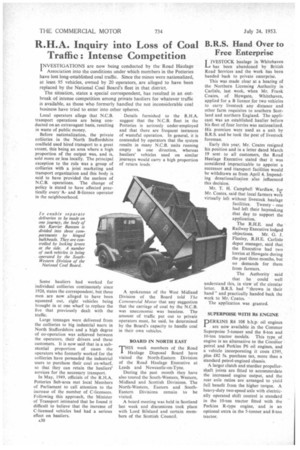R.H.A. Inquiry into Loss of Coal Traffic : Intense Competition
Page 32

If you've noticed an error in this article please click here to report it so we can fix it.
INVESTIGATIONS are now being conducted by the Road Haulage 1 Association into the conditions under which members in the Potteries have lost long-established coal traffic. Since the mines were nationalized, at least 95 vehicles, owned by 20 operators, are alleged to have been replaced by the National Coal Board's fleet in that district.
The situation, states a special correspondent, has resulted in an outbreak of intense competition among private hauliers for whatever traffic is available, as those who formerly handled the not inconsiderable coal business have tried to enter into other spheres.
Local operators allege that N.C.B. transport operations are being conducted on an extravagant basis, resulting in waste of public money.
Before nationalization, the private collieries in the North Staffordshire coalfield used hired transport to a great extent, this being an area where a high proportion of the output was, and is, sold more or less locally. The principal exception to the rule was a group of collieries with a joint marketing and transport organization and this body is said to have provided the nucleus of N.C.B. operations. The change of policy is stated to have affected practically every Aand B-licence operator in the neighbourhood.
Some hauliers had worked for individual collieries continuously since 1920, states the correspondent, but these men are now alleged to have been squeezed out, eight vehicles being brought in at one wharf to replace the five that previously dealt with the traffic.
Large tonnages were delivered from the collieries to big industrial users in North Staffordshire and a high degree of co-operation was achieved between the operators, their drivers and these customers. It is now said that in a substantial proportion of cases the operators who formerly worked for the collieries have persuaded the industrial users to purchase their coal ex-wharf, so that they can retain the hauliers' services for the necessary transport.
In May, 1949, officials of the R.H.A. Potteries Sub-area met local Members of Parliament to call attention to the increase of the number of C-licensees. Following this approach, the Minister of Transport intimated that he found it difficult to believe that the increase of C-licensed vehicles had had a serious effect on hauliers.
A30 Details furnished to the R.H.A. suggest that the N.C.B. fleet in the Potteries is seriously under-employed and that there are frequent instances of wasteful operation. In general, it is contended by operators that the system results in many N.C.B. units running empty in one direction, whereas hauliers' vehicles used on similar journeys would carry a high proportion of return loads
A spokesman of the West Midland Division of the Board told The Commercial Motor that any suggestion that the carriage of coal by the N.C.B. was uneconomic was baseless. The amount of traffic put out to private operators must, he said, be determined by the Board's capacity to handle coal in their own vehicles.
BOARD IN NORTH EAST
THIS week members of the Road Haulage Disposal Board have visited the North-Eastern Division of the Road Haulage Executive at Leeds and Newcastle-on-Tyne.
During the past month they have also toured the South-Western, Western, Midland and Scottish Divisions. The North-Western, Eastern and SouthEastern Divisions remain to be visited.
A board meeting was held in Scotland last week and discussions took place with Lord Bilsland and certain members of the Scottish Council.




























































































